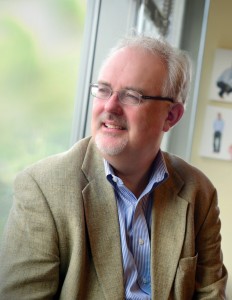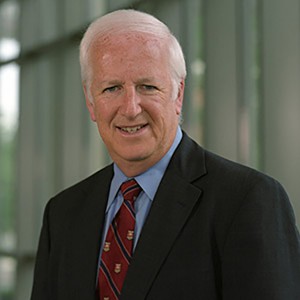This article originally appeared in The Source and is used here with permission.
The directorship of the Institute for Public Health at Washington University in St. Louis has been named in honor of Larry J. Shapiro, MD, former executive vice chancellor for medical affairs and dean of the School of Medicine.
The directorship was named through the generosity of St. Louis-based BJC HealthCare, which has an enduring relationship with the university. Washington University physicians treat patients at Barnes-Jewish and St. Louis Children’s hospitals, each part of BJC HealthCare.

Chancellor Mark S. Wrighton has announced that William G. Powderly, MD, the current director of the institute, will serve as the inaugural Larry J. Shapiro Director. Powderly also will continue in his role as the Dr. J. William Campbell Professor of Medicine and as co-director of the Division of Infectious Diseases at the School of Medicine.
“I am deeply grateful to Steve Lipstein and to BJC HealthCare for this visionary support, which will advance the work of the Institute for Public Health,” Wrighton said. “Larry Shapiro played an instrumental role in helping to establish the institute, and this is fitting recognition of his extraordinary leadership. I also am delighted that we have the opportunity to recognize Bill Powderly as the inaugural Shapiro Director.”
Washington University Trustee Steven H. Lipstein, president & CEO of BJC HealthCare, said: “Advances in public health — clean water, public sanitation systems, immunizations and many other programs to improve human health — have contributed so much to our society, to increases in our human lifespan and to our quality of life. We can think of no one who cares more about the human condition than Larry Shapiro, and we are privileged to establish this endowment in his honor.”
The Institute for Public Health seeks to address public health issues and health disparities in the St. Louis region and the world. The multidisciplinary institute draws on the expertise and efforts of faculty, researchers, practitioners, staff and students from across the university to share ideas and develop innovative solutions aimed at improving public health. Powderly was named director of the institute in 2013.
“I am deeply honored to serve as the Larry J. Shapiro Director,” Powderly said. “Larry’s support and encouragement for the institute have made it possible for those working under its umbrella to undertake important work to address gun violence, disparities in health care, antibiotic resistance, global malnutrition and other important public health issues in our St. Louis community and across the globe.”
Added Shapiro: “I could not be more pleased over Bill Powderly being named the inaugural holder of this directorship and for BJC HealthCare’s generous support. Bill has dedicated his career to finding ways to improve the lives of others and to bring attention to deeply important public health issues, health disparities in particular. He is recognized internationally for his research and breadth of knowledge, perhaps mostly for his work to improve treatments for patients with HIV. I have been proud to know and work with such a dedicated physician-scientist.”
The institute was established in 2008 under the leadership of founding director Edward F. Lawlor, former dean of the Brown School and the William E. Gordon Distinguished Professor. Graham Colditz, MD, the Niess-Gain Professor of Surgery and director of the Division of Public Health Sciences in the School of Medicine, has served as the institute’s deputy director since its inception.
The Institute for Public Health includes: the Center for Community Health Partnership & Research; the Harvey A. Friedman Center for Aging; the Global Health Center; the Center for Health Economics and Policy; the Center for Dissemination and Implementation; and the Public Health Data and Training Center.
The institute has been instrumental in bringing together faculty from diverse disciplines to improve the health of individuals in the St. Louis region and around the world. Among the institute’s many contributions is the recently created Public Health Cubed (PH3), a means of quickly providing funding to faculty teams that address complex problems requiring a multidisciplinary approach. Early PH3-funded projects include an investigation into human trafficking in St. Louis, patient perspectives on access to health care in rural Missouri, and breast cancer mortality among West African immigrants in France.
About William G. Powderly
A highly regarded specialist in infectious diseases, Powderly first came to Washington University in 1983 as a fellow and later a faculty member at the School of Medicine. He went on to serve as co-director of the Division of Infectious Diseases and director of the AIDS Clinical Trials Unit.
In 2004, Powderly returned to his native Ireland as head of the Department of Medicine at University College Dublin School of Medicine, where he served as dean from 2005 to 2012. Under his leadership, the medical school expanded its international activities, especially in Malaysia and China.
Powderly has spent more than two decades actively engaged in research to improve treatments for patients with HIV. His initial studies focused on evaluating drug cocktails to identify effective first-line treatment for HIV. He also has been involved in research to understand the long-term side effects of HIV medications, particularly metabolic problems such as diabetes, lipid abnormalities and osteoporosis.
He has been a member of numerous advisory groups on HIV and infectious diseases for the National Institutes of Health (NIH) and the U.S. Centers for Disease Control and Prevention. He was the first chairman of the HIV Medicine Association and is president of the Infectious Diseases Society of America.
Powderly has authored more than 300 scientific journal articles and book chapters on HIV and AIDS. He is a fellow of the Infectious Diseases Society of America, the Royal College of Physicians of Ireland, and the American Association for the Advancement of Science.
About Larry J. Shapiro
Shapiro’s longstanding relationship with Washington University and the St. Louis region began more than 50 years ago when he enrolled as an undergraduate in the College of Arts & Sciences. He went on to earn his medical degree from the university and complete his residency at St. Louis Children’s Hospital in 1973.

A pediatric geneticist by training, Shapiro’s career took him to the NIH, the University of California, Los Angeles, and the University of California, San Francisco, before returning to Washington University in 2003 to assume the roles of executive vice chancellor for medical affairs, dean of the School of Medicine, and the Spencer T. and Ann W. Olin Distinguished Professor. He also served as president of Washington University Medical Center, which includes the School of Medicine, Barnes-Jewish Hospital, and St. Louis Children’s Hospital.
During Shapiro’s 12-year tenure as dean, the School of Medicine was recognized for many important achievements. It consistently remained a top-10 medical school, according to annual rankings by U.S. News & World Report. It remained at the top nationwide for student selectivity, a measure of medical student undergraduate grade-point averages and MCAT scores. It ranked fourth among all medical schools in NIH funding. In addition, the Washington University Physicians clinical practice grew significantly.
Shapiro’s strong leadership has been felt on the Medical Campus and across the university and the region. Among his many contributions, he led the establishment of BioMed 21, a research initiative that seeks to make St. Louis a biotech powerhouse. It brings together scientists and clinical researchers from the School of Medicine, Arts & Sciences, and the School of Engineering & Applied Science to address important questions and rapidly translate findings into new therapies for patients.
Over the years, Shapiro has earned dozens of honors and awards for his achievements and served in leadership roles with numerous national organizations. He is a member of the prestigious American Academy of Arts & Sciences and a fellow of the American Association for the Advancement of Science. He has served as vice chair of the Council of the Institute of Medicine of the National Academy of Sciences, as a member of the Governing Board of the National Research Council and of the Scientific Management Review Board of the NIH.